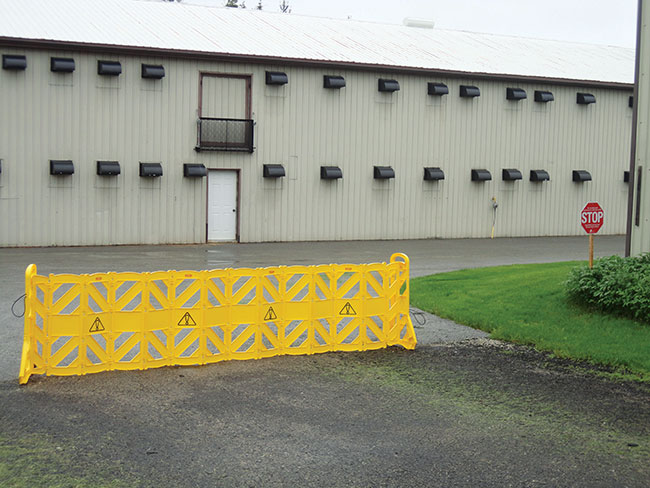
Ontario chicken farmer staying positive amid rising avian flu cases
By The Canadian Press
News Disease watch Migration MattersTwo farms in southern Ontario are under quarantine due to outbreaks and two dead waterfowl birds have tested positive in Brampton. But one producer isn't too concerned – yet.
 Experts say avian influenza outbreaks in commercial poultry are usually the result of biosecurity breaches and human error. Photo: Feather Board Command Centre
Experts say avian influenza outbreaks in commercial poultry are usually the result of biosecurity breaches and human error. Photo: Feather Board Command Centre The owner of a large Niagara-on-the-Lake chicken farm is confident all the precautions he takes will prevent an avian flu outbreak at his operation.
Two farms in southern Ontario are under quarantine due to outbreaks and two dead waterfowl birds have tested positive in Brampton.
But NOTL chicken farmer Wil Neufeld isn’t too concerned – yet.
“It’s nothing new. This has been going on for a long time,” Neufeld told The Lake Report.
There are outbreaks at a small flock farm in Chatham-Kent County and at a commercial operation in West Lincoln.
Neufeld said he received an email saying the outbreak was in Smithville.
He runs two massive broiler farms in NOTL, one on Wall Road and one on Four Mile Creek Road.
This week he’s getting a shipment of 80,000 chicks. He raises them for meat and has never had an outbreak.
He hopes to keep it that way.
“We have very strict protocols to keep it in check,” he said.
The avian influenza, also known as the bird flu, has many strains and is spread through wild birds. The current strain spreading across the globe is known as H5N1 and is deadly to birds.
In 2022, about 6.7 million birds in Canada died due to the avian flu.
Neufeld houses the 80,000 chickens between his two barns for upward of five weeks, until the birds weigh 2.2 kilos then they get shipped off to Maple Lodge Farms in Brampton.
Maple Lodge supplies poultry to major grocery stores and to restaurants like Swiss Chalet.
Once his chickens are sent to Maple Lodge Farms, his barns are empty for about four weeks while they are disinfected and cleaned. Then a new batch arrives.
These precautions allow Neufeld to make sure no diseases spread between flocks of chickens.
“With broilers, it’s five weeks in and out. Clean everything out. So, it’s easily controlled,” he said.
To lower the chance of his chickens getting sick, Neufeld keeps them in a comfortable and stress-free, climate-controlled barn.
“It’s just like humans. If you’re stressed out, you’re more likely to get sick,” he said.
Neufeld isn’t a fan of free-range operations, since those chickens are more likely to mix with wild birds and could be exposed to the virus.
A wild bird can give it to chickens and if they somehow spread it to a large commercial poultry operation, it becomes a “financial disaster,” he said.
However, in order to keep the chickens safe, large-scale poultry farms like Neufeld’s need to follow a hefty set of protocols.
“(In) Ontario, we have a very strict biosecurity program to try to combat all kinds of diseases,” he said.
A biosecurity program is enforced to minimize the introduction and spread of infectious diseases.
Diseases can come in on anything – truck tires, clothing, hands and even footwear.
Farms have a “whole book worth of protocols we have to follow and paperwork procedures,” he said.
Farmers must follow standards such as properly disinfecting boots and equipment, limiting visitor access to the chickens, maintaining a visitors log and making sure proper signage is visible.
“Chickens get a lot of diseases,” he added.
If an outbreak occurs, farms are put under quarantine by the Canadian Food Inspection Agency and an investigation is started.
The Canadian Food Inspection Agency is on top of it, said Neufeld.
However, if a farm is not infected but is within about 10 kilometres of a quarantine zone, safety precautions would be increased.
An outbreak on his farm could really affect his business – because if even one chicken gets the virus, the Canadian Food Inspection Agency requires the farm to humanely kill every bird that is infected or exposed.
All bodies, manure and eggs must be disposed of properly.
For an operation like Neufeld’s, with 80,000 chickens, that would spell big trouble.
“There’s no money in sick chickens,” he said.
Christine Nasrallah, a spokesperson for the Canadian Food Inspection Agency, told The Lake Report that “owners whose animals are ordered destroyed by the CFIA may be eligible for compensation.”
The agency will trace the disease to any other potentially infected or exposed animals and decontaminate all infected areas.
Sometimes farms can be closed for upward of six months, said Neufeld.
Once farms have been cleaned and disinfected, the agency will evaluate the operation to determine when the quarantine can be lifted, Nasrallah said in an email.
According to the Chicken Farmers of Canada, the avian flu poses no food safety risk and does not usually spread to people.
“There’s definitely no harm to the consumer,” said Neufeld.
Print this page